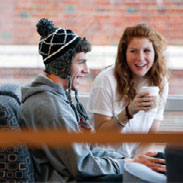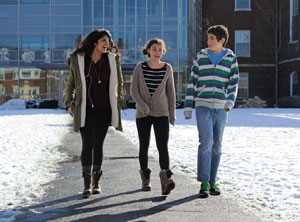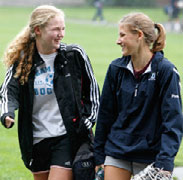
Students parse how friendship flows.
Direct answers, to fundamental questions, from Class I–transitioning from Milton to college–and Class IV, working toward friendships that last. Here’s what they said.
What is a friend?
You can be quiet, relaxed and comfortable around a friend.
A friend is trustworthy. Otherwise, you can’t be open.
A friend makes you feel good about yourself, but doesn’t necessarily always tell you what you want to hear.
You have fun with a friend; he makes you laugh, no matter what you’re doing together.
A friend watches your back.
Becoming a friend should be effortless. You can try to force friendship, but that usually doesn’t work out. The connection has to be genuine.
You have only a few very close friends that make you comfortable being completely honest.
 With a real friend, you talk about things beneath the surface—feelings, thoughts, beliefs. You trust them with those things. You can talk about things that don’t mean very much, and things that mean
a lot.
With a real friend, you talk about things beneath the surface—feelings, thoughts, beliefs. You trust them with those things. You can talk about things that don’t mean very much, and things that mean
a lot.
A friend is there to listen, to help you when something is going on, to help you improve the situation somehow—even if that’s just by taking your mind off things.
Close friends don’t need to have plans or to talk; just being with each other is comfortable, normal. There are no awkward silences.
With friends, your conversations don’t need to be situation-based.
You don’t need to impress your friends. They already know how great you are.
About finding friends
Finding friends is easier when everyone else is looking, too.
When you try new things, you make friends. You don’t have to seek out new friends—you make them when you’re doing things that you enjoy.
I try to get to know the people in my classes. We automatically have something to talk about; sometimes just getting to know a person leads to making a friend.
 At the beginning of the year you try to make friends with everyone you meet; over time you realize what works and what doesn’t. Some relationships stick, and some don’t go anywhere.
At the beginning of the year you try to make friends with everyone you meet; over time you realize what works and what doesn’t. Some relationships stick, and some don’t go anywhere.
I like to take a risk in meeting people. I met my best friend by embarrassing myself during orientation. If you can laugh at yourself, other people are more likely to want to spend time with you.
Most of my friendships began through something that we have in common—having similar personalities, being involved in the same activities, enjoying the same things. If you can find one point that connects, sometimes things will just click.
Making friends is easier when you’re little. As you get older, you tend to prejudge people and make assumptions, which can close you off to a relationship before it begins.
You get to know as many people as possible right away; you can connect with most people about something.
I usually gravitate to people who I sense are responding to a situation the same way I am—we already have that in common.
Freshman year you grab onto anyone around you. It’s proximity—who’s in your advisor group, in your class, on your team. Your first “friends” freshman year are not usually your close friends senior year.
Living at Milton, your social life stems from your dorm at first. The people you live with might be very different from you, but you get to know them well right away.
 Friendships can be linear: you move from your roommate to your hallway to the whole dorm. Eventually, you choose roommates. My roommates and I can talk for a long time, very comfortably, after lights-out.
Friendships can be linear: you move from your roommate to your hallway to the whole dorm. Eventually, you choose roommates. My roommates and I can talk for a long time, very comfortably, after lights-out.
Sometimes friendships jump stages, especially when you share a lot about yourself.
There are stages, but in the dorm, relationships are accelerated. You become close with people quickly, for better or worse, simply because of the amount of time you spend together.
When you go home, you make assumptions about your friends’ friends. You know you’ll probably be compatible with them, and you move beyond the superficial.
Friendship usually builds on shared principles or values. Even if you don’t have the same opinion on everything, I think sharing a basic moral code is important. Having different opinions on things is good—it broadens your perspective, and makes for an interesting dynamic.
Milton does a good job of helping you to make friends organically. People here encourage you to take risks and try new things, to meet people you otherwise may not.
Are your friends like you?
I’m drawn to people who are different from me—people I think are interesting, and who seem curious.
 At first I’m drawn to the people who are nicest to me, but as time goes on I gravitate toward different people.
At first I’m drawn to the people who are nicest to me, but as time goes on I gravitate toward different people.
The person in the group who initially rubbed you the wrong way can wind up being your best friend.
I do have something in common with each of my friends. That’s not always visible to the out-sider—how we look, how we dress, what team we’re on—but we have something in common.
Having a shared sense of humor is important to me. My friends and I laugh at the same type of thing—we like the same music, the same movies. That’s more important to me in my relationships than having the same political leanings or sharing the same opinions and values.
You shouldn’t confuse discussing current events with friendship. I can have intellectual, heated debates with people who aren’t my friends.
Being at Milton changed my idea of friendship. I figured that my close friends would be people just like me, but I’ve found the opposite to be true. My best friends are all very different from me. Or, the things that we have in common aren’t as obvious.
I’m outgoing and physically affectionate, and my best friend is the opposite. She’s honest, though, and she keeps me in check.
I almost have telepathy with my best friend. We can tell what the other is thinking or feeling without saying a word.
When you’re too similar, you can get on each other’s nerves. A person can understand and respect you and still have a different perspective.
Opposites attract in friendship. Being around people who aren’t like you—who have different ideas and opinions—rounds you out and helps you reach.
Friends like that can open your eyes and make you better.
How does friendship work?
You don’t expect something in return from your friends. You help each other out, but you’re not keeping track.
Long-lasting friendships have to grow and change, and we have to grow and change with them. If the individuals don’t grow, and the relationship stops evolving, it usually dies.

When you get a new phone, you know instantly who your friends are, because theirs are the 15 numbers that you need on it immediately.
Summer will be a good indication of how things will go in college—who you’ll stay friends with and who you won’t.
Most of my close friends were a year older, and then they graduated. I had to deal with that and adjust—I had to connect with the people around me when our grade had already done that. That affected my Milton experience.
Arguing with one of my really good friends affects my whole day. I can’t stop thinking or worrying about it.
Even one person missing can cause a huge gap in your friendship circle, and in your life. When my best friend was in the hospital, I would look around and think, “Where are all my friends?”
Good friends can be out of touch for a long time and come back together like no time has passed. You pick up right where you left off.
Anyone can talk idle talk. At Milton, though, people are opinionated and informed. Friends have adult-type conversations mixed in with high school-level stuff.
A senior once told me she was thinking about the idea that friends should be reflections of your more positive self. She found herself reassessing her friendships on that basis.
 Friendships should never be static, or taken for granted.
Friendships should never be static, or taken for granted.
Once you don’t need a filter with the other person, once the judgment period stops, you find a sense of ease with a close friend. A friend seems more like a sibling, like family.
Close friends can be critical, in a way that shows they care. You want each other to be the best you can be, and you can say things honestly to help the other person.
In the deepest stage of friendship, you can cry, or be mad or irrational or grumpy in front of the other person, and they don’t take that as an indicator of who you are. They’ve seen you in all kinds of moods, and they let you have them.
Sometimes, though, those friendships with people you don’t see for a long time fade. If you’re constantly trying to catch up, you can’t move forward.



